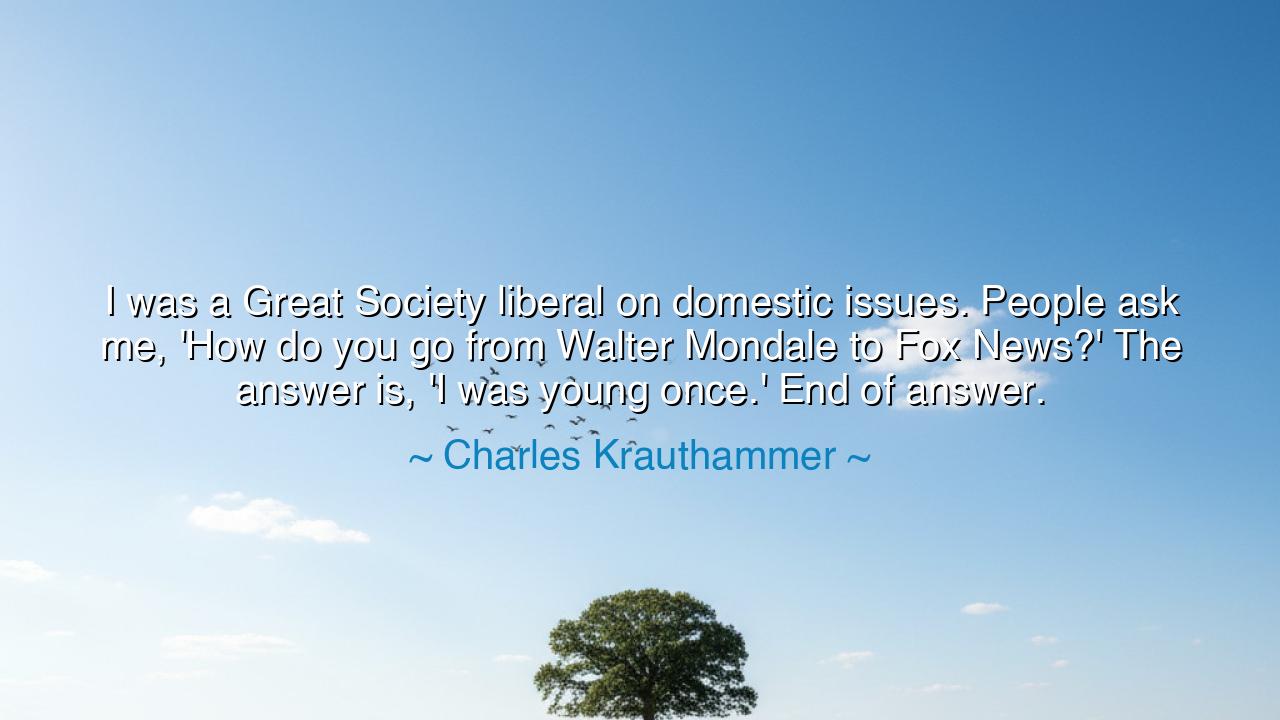
I was a Great Society liberal on domestic issues. People ask me
I was a Great Society liberal on domestic issues. People ask me, 'How do you go from Walter Mondale to Fox News?' The answer is, 'I was young once.' End of answer.






Hear the words of Charles Krauthammer, physician turned writer, a man who journeyed from the fervor of youthful liberalism to the conservatism of his later years. He once declared: “I was a Great Society liberal on domestic issues. People ask me, ‘How do you go from Walter Mondale to Fox News?’ The answer is, ‘I was young once.’ End of answer.” Within these words lies a confession, but also a reflection upon the nature of time, growth, and the transformations of belief. For he speaks of the arc of a life, and of how convictions can shift with age, with trial, with experience.
The Great Society, envisioned by Lyndon B. Johnson in the 1960s, was a vast program of reform—war on poverty, civil rights, health care, and education. To be a Great Society liberal was to believe that government could heal inequality, that policy could craft justice, that society itself could be uplifted by expansive effort. As a young man, Krauthammer embraced this vision, standing with figures such as Walter Mondale, the stalwart Democrat who embodied the ideals of progress and reform. It was a stance born of hope, a belief in the power of the state to better the lives of its citizens.
Yet time tempers hope. Krauthammer’s remark—“I was young once”—is filled with irony, but also with a kind of ancient wisdom: that youth sees possibility unshadowed by consequence, while age sees complexity and unintended costs. Many who begin with fire in their hearts find, after decades, that the policies which promised healing also bred dependency, inefficiency, or new injustices. And thus, he journeyed from liberal optimism to conservative realism, from Mondale to Fox News, not as a betrayal of ideals, but as a transformation shaped by the passing years.
History shows us this pattern again and again. Recall the French Revolution, born of youthful zeal, declaring liberty and equality for all. But in its excess, it birthed the guillotine, and in its chaos, it opened the door to Napoleon’s empire. Those who survived grew older, sobered by the cost of their dreams. Many who had once cried for radical change sought instead the stability of order. So too with Krauthammer: his youthful embrace of sweeping reform gave way to a more measured defense of tradition, order, and caution.
The deeper meaning of his words is not simply about liberalism or conservatism, but about the evolution of belief itself. Every person must confront the passage of time and the changing vision it brings. To be “young once” is to live in the fire of ideals, but to age is to see the world’s stubbornness, its resistance to transformation, and the unintended burdens of noble policies. Some will hold to their youthful visions, others will reshape them, and still others will turn to entirely new convictions. The journey of thought is as much a part of life as the journey of the body.
The lesson here is twofold. First: do not despise the idealism of the young, for it is the wellspring of progress. Without youthful dreamers, no reform, no civil rights, no liberation would ever be born. Second: do not scorn the realism of the aged, for it carries the weight of experience, the memory of failures, the humility of limits. A wise society needs both: the fire of youth and the caution of maturity, blended like iron and water, to forge a future both daring and enduring.
Therefore, let us act with balance. If you are young, dream boldly, but listen to the lessons of those who have walked before. If you are older, speak of your experience, but do not extinguish the fire of those who hope. And in your own heart, hold space for transformation, for to live is to grow, and to grow is to change.
So let Krauthammer’s words endure: “I was young once.” They are not dismissal but reflection, not cynicism but testimony. They remind us that belief is not static, but a river shaped by the rocks of life. To embrace this truth is to walk humbly with our convictions, knowing that both reform and restraint, both youth and age, are needed to guide the destiny of society.






AAdministratorAdministrator
Welcome, honored guests. Please leave a comment, we will respond soon